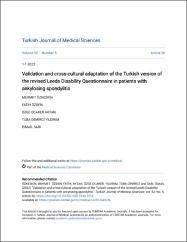Validation and cross-cultural adaptation of the Turkish version of the revised Leeds Disability Questionnaire in patients with ankylosing spondylitis
Citation
ÖZKESKİN, MEHMET; ÖZDEN, FATİH; AKTAN, ÖZGE OCAKER; YILDIRIM, TUBA DEMİRCİ; and SARI, İSMAİL (2022) "Validation and cross-cultural adaptation of the Turkish version of the revised Leeds Disability Questionnaire in patients with ankylosing spondylitis," Turkish Journal of Medical Sciences: Vol. 52: No. 5, Article 36. https://doi.org/10.55730/1300-0144.5516Abstract
Background/aim: The revised Leeds Disability Questionnaire (RLDQ) is a unique assessment tool for patients with ankylosing spondylitis (AS); its comprehensive structure includes posture and neck flexibility parameters. The aim of the study was to determine the psychometric properties of the Turkish RLDQ in patients with AS. Materials and methods: A total of 100 AS patients were enrolled in the study. In the first evaluation, patients filled out the Dougados Functional Index (DFI) and Bath Ankylosing Spondylitis Functional Index (BASFI), Stanford Health Assessment Questionnaire (HAQ) in addition to RLDQ. Then, patients were refilled the revised RLDQ in the second assessment. Results: The mean age of the patients (40 women, 60 men) was 48.3 ± 12.6 years. The test-retest reliability and internal consistency of the RLDQ total score were excellent. ICC score and Cronbach’s alpha score were calculated as 0.853 and 0.905, respectively. The SEM and MDC values calculated for the RLDQ total score were 2.74 and 7.60, respectively. RLDQ had degrees of correlation with DFI, HAQ, and BASFI of 0.814, 0.742, and 0.852, respectively. Construct validity was excellent (r > 0.50, p < 0.01). Conclusion: The Turkish version of the RLDQ was found to be valid and reliable in patients with AS. It should be emphasized that the RLDQ is a distinctive and valuable tool that focuses separately on neck, posture, or other mobility parameters in the clinical assessment of AS.


















